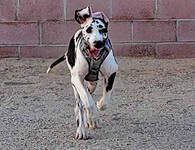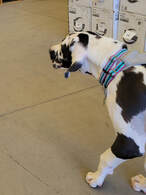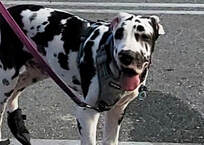 Does your dog have a reliable recall? Many don't and most dogs only respond when they want to. When a puppy or rescue comes home they often will follow us around and recall doesn't seem necessary until they begin to get a little more interested in the environment. They will appear to develop selective hearing, at least part of the time anyway. There are some easy steps to developing a reliable recall. It also is a matter of safety that your dog will respond. How do you build a solid and reliable recall in your dog? Easier and a lot more fun than you think. Here are some tips:
0 Comments
RuhRoh is 4 months old and hit a normal fear period the week before last. When she and I went to get in the car she spotted the garbage can on the curb and started backing up and giving a low 'woof'. The same garbage can that has been there every week that she paid no attention to previously. So we walked over to it, at her pace, rewarding every step of the way until she was no longer concerned. You can see at first her tail is swishing rather than wagging. She moves forward then backs up. I've attached the ring video but it's not the best quality. Saturday we tried to go to the home improvement store but she let us know she did not want to do that. Instead we hung out in the parking lot, watching people and carts go by. She got lots of treats when she engaged. Then we left. We didn't push it any further, just went home with lots of rewards. This way she was left with the positive rather than a scary impression if we'd tried to push her.  Thursday we made another trip to the home improvement store and she rocked it. I had no goal in mind, just following her lead. She was excited, showing none of the fearful behaviors from Saturday. She wasn't hiding behind us, she was wiggling with excitement (her back end wiggles so hard she smacks herself in the face with her tail), she gave little barks (well, for a Great Dane they are little barks) to get people to pay attention to her and as soon as they looked she'd wiggle even harder. This is why I tell puppy people not to make too big of a deal when something that was normal is suddenly causing fear. Don't make a big deal of it, reward the little interactions (if they look, if they get closer, if they don't hide) so that a positive impression is what your puppy is left with. If it's a normal fear period your dog will grow out of it fairly quickly. If it's more than that talk to a trainer who specializes in treating fearful dogs using reward based methods sooner rather than later. The American Veterinary Society of Animal Behavior has released their position statement that supports the use of reward based methods for all training. Click on the link below to read the entire statement. Evidence supports the use of reward based methods for all canine training. AVSAB promotes interactions with animals based on compassion, respect, and scientific evidence. Based on these factors, reward-based learning offers the most advantages and least harm to the learner’s welfare. Research supports the efficacy of reward-based training to address unwanted and challenging behaviors. There is no evidence that aversive training is necessary for dog training or behavior modification Humane Dog Training Position Statement Punishment can cause fallout behaviors. Increased aggression against other humans and/or dogs, anxiety, fear... it goes on and on. This is the reason I set out to educate myself, having seen the difference in our own dogs. Due to a combination of a back yard breeder and major health issues that resulted in isolation during her first year we had a Great Dane with just about every behavior challenge there is. Punishment was used to try and correct the behavior issues, from reactivity to resource guarding. We weren't beating her but we were using a prong collar, yelling... It did not work. The behaviors would stop temporarily and then come back worse. What appeared to be 'behaving' was actually her shutting down. It wasn't changing her emotional response which is what is needed for long term success. Through education I learned how to have a positive approach while using science as the guide. It does not matter the dog breed. We have worked with everything from the smallest Chihuahuas and Yorkies to the largest Pitbulls and Great Danes, high drive dogs like GSDs and Huskies as well as everything in between. What I learned with Jinkies gave me the passion to do what I do. To help other dogs without pain, without punishment. #reinforcementdrivesbehavior #sciencematters #dogtrainingrocks #compassion #respect #kindness #rewardbasedtrainingisbest #lovemyjob |
Ronda WarywodaCPDT-KA, UW-AAB Categories
All
Archives
July 2023
|


